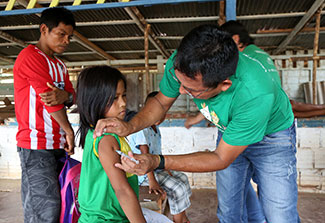Focus on cancer: Global studies show single dose of HPV vaccine provides protection
July / August 2018 | Volume 17, Number 4

Photo by Harold Ruiz/PAHO-WHO
A girl in Brazil’s Amazonas region is given the HPV vaccine
during a mass vaccination campaign in 2016.
By Karin Zeitvogel
Of the 528,000 women diagnosed worldwide each year with cervical cancer, more than half die of the disease. They live mainly in low- and middle-income countries (LMICs), which lack the infrastructure, trained personnel and funds to put in place a systematic and sustained cervical cancer screening process, or to give multiple doses of a vaccine. Both have helped bring down cervical cancer cases and deaths in high-income countries.
In 2004, a clinical trial was launched in Costa Rica to evaluate the efficacy of three doses of an HPV vaccine developed by a team of researchers, including several from the National Cancer Institute (NCI). Some of the nearly 7,500 women enrolled in the trial didn’t receive all three doses, often because they became pregnant. At the end of the four-year trial, the researchers were surprised by the results: Women who received one or two doses of the vaccine had the same protection against HPV infections as the three-dose group.
“This leads us to believe that one dose may be enough. We’re formally evaluating this research question now in a randomized controlled trial,” said NCI’s Dr. Aimée Kreimer, a senior investigator on the Costa Rica study and a co-principal investigator on the follow-up trial.
The future of HPV vaccination lies in reducing the number of doses needed and developing a vaccine that protects against more of the dozen HPV types that can cause cancer, one of the inventors of the HPV vaccine, NCI deputy director Dr. Doug Lowy, has said. Confirmation that one dose of HPV vaccine is as protective as three would, in combination with affordable, accessible screening, be a big step toward potentially eliminating cervical cancer. “We think one dose is important for the world,” Kreimer said.
Fogarty- and other NIH-supported projects are helping to meet another pressing need in the fight against cervical cancer by providing research and clinical training to people in LMICs. NCI scientists are also working to streamline screening methods to allow women to self-test at home or be tested, diagnosed and start treatment in a single visit to a clinic.
More Information
To view Adobe PDF files,
download current, free accessible plug-ins from Adobe's website.